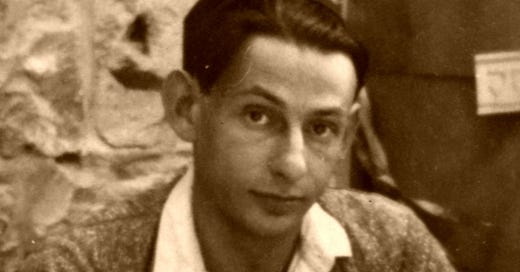I’m currently reading Gershom Scholem’s phenomenal autobiography called “From Berlin to Jerusalem”. Scholem grew up in pre-WWI Berlin, and although he knew his parents were Jewish and was not like the many German Jews who had baptised themselves to gain further acceptance into the Volk, he writes that when Christmas time came around, his family would bring a tree into the house and sing German folk songs while cracking Yiddish jokes. Hardly what we would consider a “Traditional” Jewish family today. Even Yom Kippur was not observed.
This sad state of affairs was actually how the majority of German Jewish families found themselves. A mixture of the Haskalah, affluence, and a dire need for them to be accepted into Deutsche gesellschaft (German society) led many Jews to completely leave their tradition, with many even choosing to convert to Christianity1. A country that had once hosted the likes of the Rosh and R’Akiva Eiger, now had bans on communal study of the Talmud.
So bent on becoming part of German culture even the Holocaust was not able to shake their alleigence to the Volk. Scholem recounts meeting his brother years after the war:
When we had a reunion with him in Zurich shortly after his eightieth birthday, my wife, who was not well versed in these German matters, asked him what he really was. He answered, perhaps overdoing it a bit: “I am a Deutschnationaler.” “What?!” said my wife, “and you say that after Hitler?” “I’m not going to let Hitler dictate my views to me!” he replied. That left her speechless.
We can see not just the level of assimilation into German culture but the complete takeover of the Jewish identity by way of German nationalism.
One has to realize that at this point in history, the idea of Kiruv was nonexistent. The bastions of traditionalism in eastern Europe were dealing with their own sets of problems. R’ Hirsches “Torah Im Derech Eretz”, while completely revitalizing the community in Frankfurt had not been able to make inroads with most of the German Jews who were considered too far gone and decidedly anti-Torah. Doomed to be lost to history and completely assimilate, until the arrival of the Zionist movement. Zionism was able to do what traditional Orthodoxy had failed to do in the German nation, making sure that Jews were able to keep their Jewish identity in the modern world.
Scholem writes explicitly about this:
I should also say that the reason I embraced Zionism was not that the establishment of a Jewish state (which I defended in discussions) as the main goal of the movement seemed urgent and utterly convincing to me. For me as for many others, this aspect of the movement played only a secondary role, or none at all, until Hitler's destruction of the Jews. Those aspects of Zionism that dealt with politics and international law were not of prime importance to many of those who joined the movement. Of great influence, however, were tendencies that promoted the rediscovery by the Jews of their own selves and their history as well as a possible spiritual, cultural, and, above all, social rebirth. If there was any chance of a fundamental renewal whereby the Jews would fully realize their inherent potential, this-so we believed-could happen only over there, where a Jew would encounter himself, his people, and his roots.
Gershom Scholem, while not becoming a full Orthodox Jew, moved to Palestine in 1923, settling in Jerusalem. He spent his entire academic career studying Kabbalah. He founded the department of Jewish mysticism in the Hebrew University. In 1946 Scholem was sent by the Hebrew University to search for Jewish books that had been plundered by the Nazis and help return them to their rightful owners. In 1968, he was elected president of the Israel Academy of Sciences and Humanities. He is widely regarded as the foremost scholar and historian on Jewish mysticism.
Sadly, this did not stop Hitler and the Nazi’s from finding these assimilated Jews with the Mischling test, one jewish grandparent was enough.






Nice overview. Just to quibble: "the idea of Kiruv was nonexistent". That's not completely true. There were people who made an effort to reach out to secular Jews. The most famous example was R' Yisrael Salanter. I believe Scholem himself studied with religious Jews who made efforts to teach groups of secular Jews